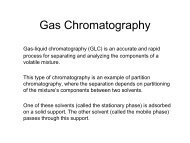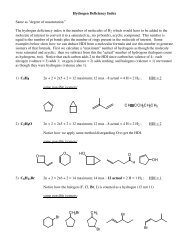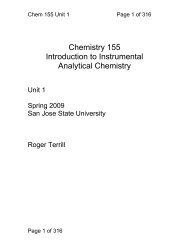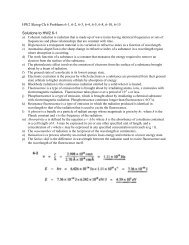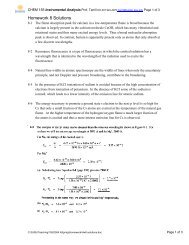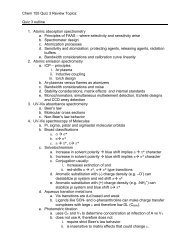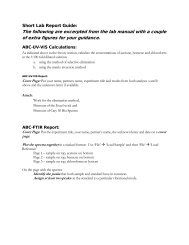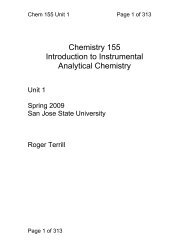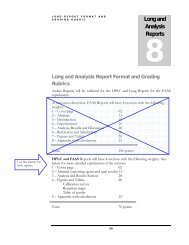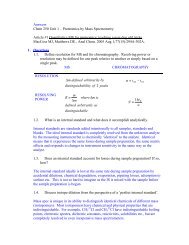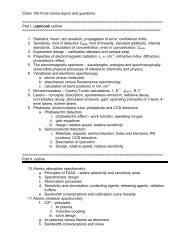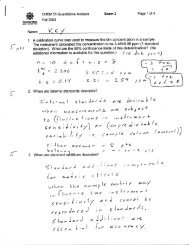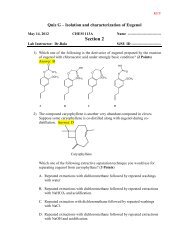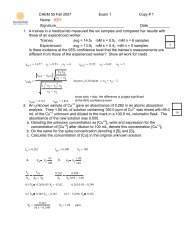Justice Studies - Department of Chemistry - San Jose State University
Justice Studies - Department of Chemistry - San Jose State University
Justice Studies - Department of Chemistry - San Jose State University
Create successful ePaper yourself
Turn your PDF publications into a flip-book with our unique Google optimized e-Paper software.
JS 107—<strong>Justice</strong> Management was changed to <strong>Justice</strong> Management and Ethics to include ethicalchallenges and issues, as well as ethical principles that ideally guide the management <strong>of</strong> justicerelated institutions as a more central component to the course.JS 110—Intervention and Mediation Methods was changed to Crisis Intervention, Mediation andRestorative <strong>Justice</strong> to include theory, research and skills in communication and problemresolution and to make restorative justice more central to the course.JS 111—Advanced Criminal and Correctional Law was changed to Special Topics in Law and<strong>Justice</strong> in order to expand the breadth <strong>of</strong> possible topical issues dealt with in this elective. Theparameters for content in Advanced Criminal and Correctional Law were quite narrow andspecialized, and its new incarnation makes the course more broadly relevant to a wider range <strong>of</strong>our students.JS 112—Advanced Criminal Investigation was changed to Criminalistics to focus on evidencecollection and preservation rather than investigation more generally, as Criminalistics is arequired part <strong>of</strong> the Forensic Science degree programs (although JS 112 is also an elective for JSmajors).JS 115—Contemporary Issues in Criminal <strong>Justice</strong> was changed to Critical Ideas and Issues in<strong>Justice</strong>. It was also changed from an elective to a required course. JS 115 is now a required“gateway” course for upper-division majors. It introduces students to various conceptions <strong>of</strong>justice (moral, social, political, etc.), exposes them to situations <strong>of</strong> injustice around the world,both historical and present-day, and asks them to consider policies and practices that promote ordetract from justice. The course thus creates an intellectual context for students’ considerations<strong>of</strong> justice in other department courses. It also integrates a series <strong>of</strong> activities that are designed tomake the connections between justice as a theoretical concept and justice in practice. Courseactivities are coordinated by undergraduate peer mentors who work with the JS 115 students insmaller groups.JS 117—Questioned Documents Examination was eliminated as dated and not relevant to mostmajors. Document examination is essentially a vocational skill for a small segment <strong>of</strong> justicepr<strong>of</strong>essionals, who are trained in these specialized techniques by their agencies.JS 118—Nature <strong>of</strong> Crime was changed to Crime and Delinquency Theory to emphasize thecourse focus on theories <strong>of</strong> crime rather than descriptive materials.JS 122—Narcotics and Drug Abuse was changed to Drugs and Society to move the class fromprimarily a pharmacology or public health perspective to one that centrally considers the societalimplications <strong>of</strong> and responses to drug use. The course now includes historical perspectives ondrug laws, theoretical perspectives on use and abuse, international comparisons <strong>of</strong> drug policy,and the economic and foreign-policy implications <strong>of</strong> drug trafficking.JS 132—Women, Minorities and the Law was changed to Race, Gender, Inequality and the Lawto indicate more clearly the course focus on inequality in all its forms, and the consideration <strong>of</strong>both genders and all races.7



